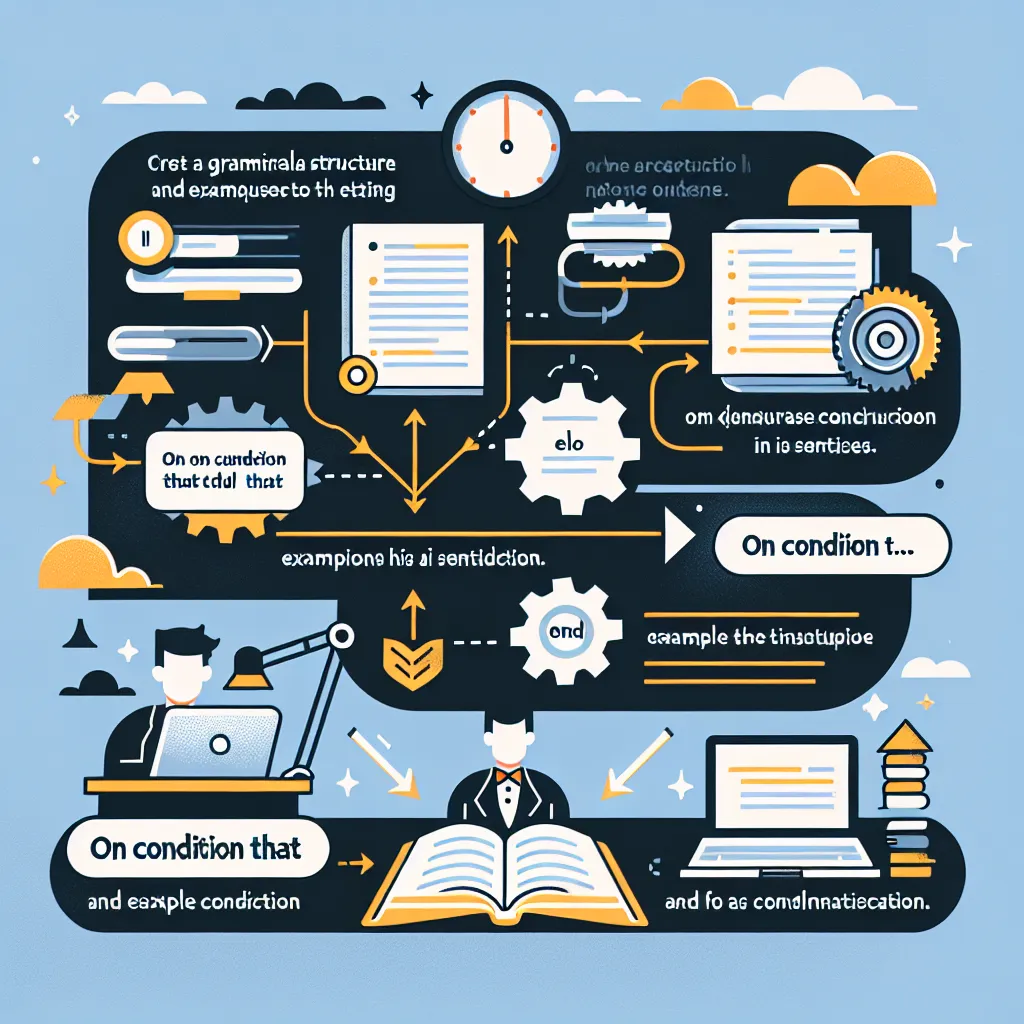“On condition that” is a crucial conditional phrase that frequently appears in IELTS exams. Understanding its usage can significantly enhance your performance across all sections of the test. Let’s delve into this important grammatical structure and explore how to effectively employ it in your IELTS preparation and exam.
Understanding “On Condition That + Clause”
“On condition that” is a conditional expression used to introduce a condition that must be met for something else to happen. It’s similar in meaning to “if” or “provided that,” but it carries a more formal tone, making it particularly useful in academic and professional contexts.

Grammatical Structure
The basic structure is:
[Main clause] + on condition that + [conditional clause]
For example:
- “The company will sign the contract on condition that all terms are agreed upon.”
- “You can borrow my car on condition that you return it with a full tank of gas.”
- “The government will provide funding on condition that the project meets environmental standards.”
In these examples, the part after “on condition that” represents the condition that must be fulfilled for the main clause to be valid.
Using “On Condition That” in IELTS Writing
Incorporating “on condition that” in your IELTS Writing task can demonstrate a high level of grammatical proficiency. Here’s how you can use it effectively:
Task 1 (Academic)
While less common in Task 1, you might use it to describe conditional relationships in data:
“The graph shows that sales increased on condition that marketing expenditure exceeded $100,000 per quarter.”
Task 2
This structure is particularly useful in Task 2 essays, especially when discussing policies, agreements, or hypothetical situations:
-
“Many argue that developed nations should provide aid to developing countries on condition that the funds are used transparently.”
-
“Universities could offer free education on condition that students commit to working in underserved areas after graduation.”
-
“Governments might agree to reduce carbon emissions on condition that other nations make similar commitments.”
“On Condition That” in IELTS Speaking
Using “on condition that” in the Speaking test can showcase your advanced language skills. Here are some examples:
-
“I’d be willing to work overtime on condition that I get compensated fairly.”
-
“In my country, citizens receive free healthcare on condition that they contribute to the national insurance scheme.”
-
“Many companies offer flexible working hours on condition that employees meet their targets.”
Alternatives and Variations
To further enhance your IELTS score, consider using these alternatives to “on condition that”:
- Provided that
- As long as
- On the understanding that
- Given that
- Assuming that
For example:
“The project will proceed, provided that we secure adequate funding.”
Common Mistakes to Avoid
When using “on condition that,” be careful to avoid these common errors:
-
Using the wrong tense: “On condition that” is typically followed by the present tense, even when referring to future events.
Incorrect: “I will attend the meeting on condition that you will prepare the report.”
Correct: “I will attend the meeting on condition that you prepare the report.” -
Confusing with “under the condition”: While similar, “under the condition” is less common and slightly different in usage.
Incorrect: “I’ll lend you the money under the condition that you pay me back next month.”
Correct: “I’ll lend you the money on condition that you pay me back next month.” -
Overusing the phrase: While it’s good to demonstrate your knowledge of this structure, using it too frequently can make your writing or speaking seem unnatural.
Achieving Higher Band Scores with “On Condition That”
To achieve a higher band score in IELTS, it’s not just about using complex structures like “on condition that,” but using them accurately and appropriately. Here’s how you can use this phrase to target different band scores:
Band 6-6.5:
Use “on condition that” correctly in simple sentences:
“I will agree to the proposal on condition that we review it annually.”
Band 7-7.5:
Incorporate the phrase into more complex sentences and use it alongside other advanced structures:
“While the government is willing to provide subsidies to renewable energy companies, they will do so only on condition that these firms demonstrate substantial reductions in carbon emissions over the next five years.”
Band 8-9:
Use the phrase flexibly, including in hypothetical situations, and combine it with other advanced grammatical structures:
“Had the negotiations been successful, the treaty would have been signed on condition that all parties agreed to regular environmental audits, which, regrettably, proved to be a stumbling block for several key stakeholders.”
Conclusion
Mastering the use of “on condition that” can significantly enhance your performance in the IELTS exam. By incorporating this phrase correctly in your writing and speaking, you demonstrate a sophisticated command of English conditional structures. Remember to practice using it in various contexts and combine it with other advanced grammatical structures to aim for higher band scores.
For further practice, try incorporating “on condition that” in essays about topics like international agreements, educational policies, or environmental regulations. These subjects often involve conditional scenarios where this phrase can be naturally and effectively employed.
Should the project succeed, we will celebrate – This article provides additional insights into conditional structures that can complement your use of “on condition that.”
Should you change your mind, call me – Explore more conditional phrases to diversify your language in IELTS tasks.